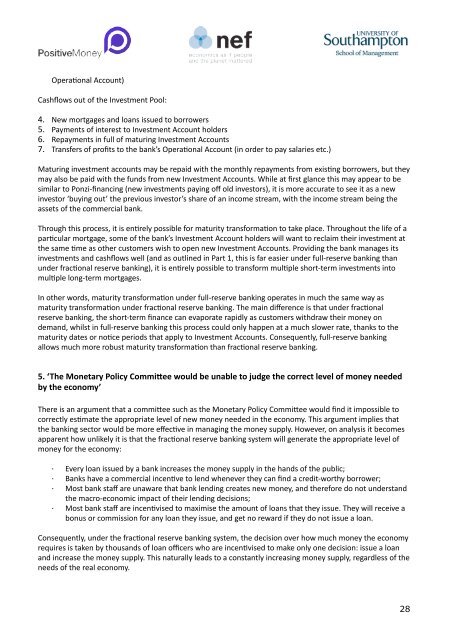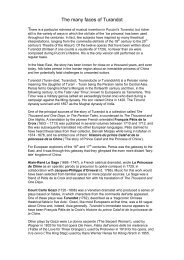NEF-Southampton-Positive-Money-ICB-Submission
NEF-Southampton-Positive-Money-ICB-Submission
NEF-Southampton-Positive-Money-ICB-Submission
Create successful ePaper yourself
Turn your PDF publications into a flip-book with our unique Google optimized e-Paper software.
OperaGonal Account)<br />
Cashflows out of the Investment Pool:<br />
4. New mortgages and loans issued to borrowers<br />
5. Payments of interest to Investment Account holders<br />
6. Repayments in full of maturing Investment Accounts<br />
7. Transfers of profits to the bank’s OperaGonal Account (in order to pay salaries etc.)<br />
Maturing investment accounts may be repaid with the monthly repayments from exisGng borrowers, but they<br />
may also be paid with the funds from new Investment Accounts. While at first glance this may appear to be<br />
similar to Ponzi-‐financing (new investments paying off old investors), it is more accurate to see it as a new<br />
investor ‘buying out’ the previous investor’s share of an income stream, with the income stream being the<br />
assets of the commercial bank.<br />
Through this process, it is enGrely possible for maturity transformaGon to take place. Throughout the life of a<br />
parGcular mortgage, some of the bank’s Investment Account holders will want to reclaim their investment at<br />
the same Gme as other customers wish to open new Investment Accounts. Providing the bank manages its<br />
investments and cashflows well (and as outlined in Part 1, this is far easier under full-‐reserve banking than<br />
under fracGonal reserve banking), it is enGrely possible to transform mulGple short-‐term investments into<br />
mulGple long-‐term mortgages.<br />
In other words, maturity transformaGon under full-‐reserve banking operates in much the same way as<br />
maturity transformaGon under fracGonal reserve banking. The main difference is that under fracGonal<br />
reserve banking, the short-‐term finance can evaporate rapidly as customers withdraw their money on<br />
demand, whilst in full-‐reserve banking this process could only happen at a much slower rate, thanks to the<br />
maturity dates or noGce periods that apply to Investment Accounts. Consequently, full-‐reserve banking<br />
allows much more robust maturity transformaGon than fracGonal reserve banking.<br />
5. ‘The Monetary Policy Commieee would be unable to judge the correct level of money needed<br />
by the economy’<br />
There is an argument that a commiOee such as the Monetary Policy CommiOee would find it impossible to<br />
correctly esGmate the appropriate level of new money needed in the economy. This argument implies that<br />
the banking sector would be more effecGve in managing the money supply. However, on analysis it becomes<br />
apparent how unlikely it is that the fracGonal reserve banking system will generate the appropriate level of<br />
money for the economy:<br />
·∙ Every loan issued by a bank increases the money supply in the hands of the public;<br />
·∙ Banks have a commercial incenGve to lend whenever they can find a credit-‐worthy borrower;<br />
·∙ Most bank staff are unaware that bank lending creates new money, and therefore do not understand<br />
the macro-‐economic impact of their lending decisions;<br />
·∙ Most bank staff are incenGvised to maximise the amount of loans that they issue. They will receive a<br />
bonus or commission for any loan they issue, and get no reward if they do not issue a loan.<br />
Consequently, under the fracGonal reserve banking system, the decision over how much money the economy<br />
requires is taken by thousands of loan officers who are incenGvised to make only one decision: issue a loan<br />
and increase the money supply. This naturally leads to a constantly increasing money supply, regardless of the<br />
needs of the real economy.<br />
28



